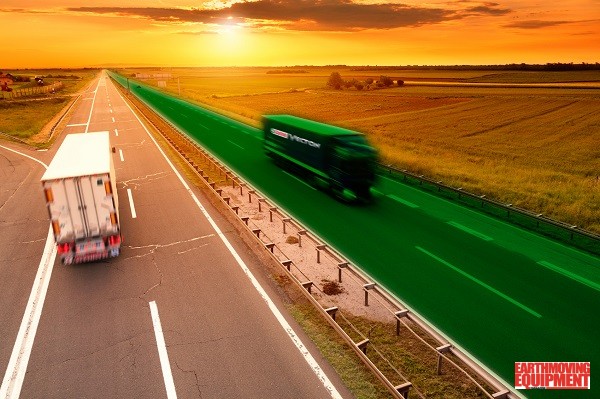Words / Jon Gibson – For Earthmoving Equipment Magazine
No matter which way you look at it, be it as a good corporate citizen, a member of the global community or even as a parent, it makes sense to consider the impact our business activities have upon the environment.
With the current economic constraints affecting our industry, it can be hard to justify green initiatives to shareholders without a solid financial argument to support them. Our industry consumes a lot of hydrocarbons and in turn produces a significant amount of carbon emissions, contributing to global warming and air quality degradation. Fuel efficiency and exhaust gas cleanliness are a key focus for OEMs (Original Equipment Manufacturers) driven largely by legislative requirements. Equipment owners and contractors looking to hire plant are looking at fuel burn as one of the key factors in their decision-making process. This has brought about a lot more diversity, competition and opportunity amongst emerging OEMs.
Brands such as Doosan that had low market share as recently as three years ago are now taking a greater slice of the market, largely on the back of their fuel efficiency and low ownership costs. It would seem that brand loyalty is less of a factor these days, and that competition and low margins have driven a greater focus on making good business decisions.
In most cases, it isn’t viable to go out and change machines every time an OEM produces a slightly more fuel efficient model than you currently run. What you can do however is use lubricants that not only improve engine efficiency, but also tick the box with regards to environmental impact.
Castrol, in a world first for the diesel engine market, have launched the very first Carbon Neutral Diesel Engine Oil. Carbon neutrality is not new to Castrol with their professional range of passenger car engine oils achieving carbon neutrality around 18 months ago. The difference with Castrol Vecton is that they are supporting carbon offset environmental initiatives right here in Australia with the VECTON range. The Castrol VECTON program is fully approved by the Federal Governments – National Carbon Offset Standard and was the first product from the automotive industry to be certified as such.
Reducing your business’ carbon footprint is no longer an option. It is a necessity for good business. The evolving demands of the Australian transport and construction sectors mean that winning and retaining future contracts will require a fresh approach.
That’s where Castrol play a key role, because now with every litre of Castrol VECTON, you effectively reduce, replace and neutralise 2.7kg of CO2. So you’re doing something positive for the planet and giving your business a competitive edge in the process.
The best thing about it is that at this stage, Tasmania and Australia as a whole are benefiting both environmentally and financially from the global offset through support of the REDD program in Tasmania. You may not have known that Tasmania is the most forested state in Australia with 3.3 million hectares (or 50 per cent of the land mass) covered. However, forestry in Tasmania is a controversial topic with competing interests fighting for timber rights and conservation simultaneously. When forests are cleared or turned into short-lived products like paper, large volumes of greenhouse gases are released into the atmosphere. The REDD program, backed by Castrol’s VECTON range is helping to save the forest while providing an alternate source of income for farmers.
By agreeing to protect their forests rather than logging them, the farmers involved will help to prevent the release of more than half a million tonnes of CO2 into the atmosphere over the lifetime of the 35-year project.
The Hon. Greg Hunt MP, Minister for the Environment published a Media Release on May 4 officially announcing and recognising the NCOS certification of Castrol’s product.
In the release, Hunt stated: “Castrol Australia’s VECTON range of engine oils is the first product from the automotive industry certified as carbon neutral… and by purchasing products such as Castrol’s VECTON engine oil, organisations are able to reduce their carbon footprint. By reducing greenhouse gas emissions and offsetting the remainder, certified entities are part of a proactive and environmentally responsible network of leading enterprises committed to achieving a low emissions future.”
Carbon Neutrality is achieved when the net greenhouse gas emissions of an organisation, event, service or a product are equal to zero. In Castrol VECTON’s case, they’ve used the ‘Cradle to Grave’ approach meaning that every phase of the life cycle of the lubricant has been considered. The net greenhouse gas emissions for production, transportation, use and disposal of the Castrol VECTON range is now equal to zero.
Castrol therefore met NCOS accreditation requirements by reducing emissions and then acquiring and cancelling offset units to match remaining emissions in accordance with the National Carbon Offset Standard.
By supporting projects that either avoid the release of the CO2 amount or by absorbing the equivalent amount of CO2 from the air that otherwise would have remained in the atmosphere, your carbon footprint can be reduced. What’s more, the projects that carbon offsetting supports often have other positive effects such as creating local jobs in rural economies or improving air quality. So carbon offsetting not only helps people to become more environmentally responsible, but often brings wider social and economic benefits.
With over 100 years of history affiliated with countless world firsts, world’s fastest and world’s largest engineering marvels, it should come as no surprise that Castrol lead the way with regards to reducing the environmental impact of the demand for hydrocarbons and lubricants. This is great news for all Australians, not only in our industry but in our community.
Congratulations go to Castrol for setting the new standard for ‘Big Oil’.



